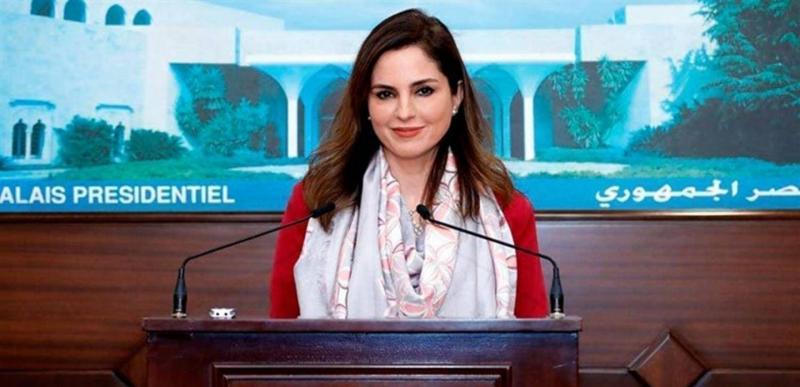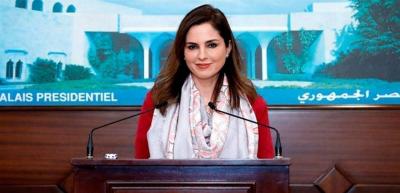Based on the general lockdown decision in Lebanon issued on January 5, 2021, and in the interest of public welfare, Minister of Information in the caretaker government, Dr. Manal Abd al-Samad Najd, issued a decision regarding the preventive measures that must be taken within the ministry to limit the spread of the COVID-19 virus. This decision also includes necessary actions to intensify awareness campaigns about the virus. The decision stipulates alternating shifts among employees in the Ministry of Information to ensure daily attendance does not exceed 25%, thus ensuring the continuity of work.
Additionally, ministry employees are required to adhere to maximum public safety measures and comply with health guidelines issued by the Ministry of Public Health, particularly prohibiting gatherings in offices and work areas, wearing masks at all times, and using necessary sanitizers. The ministry requested the National News Agency, the Lebanese Radio Directorate, and the Lebanese Studies and Publications Directorate to intensify awareness campaigns about COVID-19, especially during peak times, through reports, interviews, guidelines, previously distributed films, and other media materials about the virus, highlighting the evolution of infection cases, risks of transmission, public safety measures, necessary protection and prevention methods, and the applicable measures for travelers and those arriving in Lebanon, including the importance of mandatory quarantine.
The Lebanese Minister of Information further called for updating the latest developments and information related to COVID-19 on the ministry's official website, Corona.ministryinfo.gov.lb, and the National News Agency's website to combat fake news: Factchecklebanon.nna-leb.gov.lb. He urged heads of units to oversee the proper implementation of this decision within their respective units. The minister concluded her statement by stating that this decision will be effective starting from the morning of Thursday, January 7, 2021, until the morning of Monday, February 1, 2021, and it will be published and communicated as needed.
It is worth noting that the office of the Minister of Information in the caretaker government, Dr. Manal Abd al-Samad Najd, responded to an article in Al-Akhbar newspaper on January 6, 2021, titled "Minister Refuses Lockdown," which accused the minister of opposing the lockdown in Lebanon. The office clarified the minister's commitment to employee safety and her implementation of all necessary preventive measures to safeguard her health, her family's health, and the health of employees in the Ministry of Information, whom she considers her extended family. The office further stated that Abd al-Samad was among the first to issue a decision mandating adherence to preventive measures and convened an awareness meeting regarding the pandemic for ministry employees on March 5, following the first case reported in the country. Continuous awareness campaigns are also conducted in collaboration with UN organizations. Additionally, out of precaution and the desire to maintain work and productivity, many meetings and virtual conferences are held via Zoom.
The office denied allegations circulated about the ministry, asserting that the news was entirely unfounded and aimed at tarnishing the minister's reputation, who works with integrity and responsibility. They urged the mentioned newspaper to ensure accuracy in reporting to maintain its credibility and to reach out to the minister or her office for inquiries on any subject, as her doors are always open.
Earlier on the same day, President Michel Aoun exceptionally approved the complete lockdown starting from Thursday, January 7, until the morning of February 1, as part of measures to combat the spread of COVID-19 in the country, based on a proposal by the Prime Minister and the ministerial committee responsible for monitoring the disease. The president also approved a proposal from the Minister of Health to sign a contract with Pfizer for the purchase of necessary vaccines, with the exceptional approval to be issued after the Prime Minister's signature.
The ministerial committee for the COVID-19 pandemic decided on Monday to implement a complete lockdown in Lebanon starting from next Thursday until February 1. The caretaker Minister of Health announced a decision for a complete lockdown for three weeks beginning on Thursday, January 7, until the morning of February 1.
Minister Hamad Hassan stated that the decision is defined by the Ministry of Interior, which will also set the schedule for opening and closing establishments, which will be announced tomorrow. He emphasized that the pandemic challenge has reached a level that poses a danger to the lives of Lebanese citizens, as hospitals are unable to provide enough beds. Doctors, military personnel, and journalists will be exempt from the lockdown decision, as will the international airport and the border with Syria.
Minister of Interior Mohamed Fahmy, following a meeting of the coronavirus ministerial committee, clarified that the responsibility lies more with the citizens than with the state and urged the Lebanese to assist the security forces in enforcing the decisions. He revealed that the unique and double vehicle movement regulation will be applied and called on all citizens to adhere to the instructions to help security forces combat the pandemic.
The Health Committee proposed a three-week complete lockdown to manage the rising cases while allowing time for the healthcare sector, particularly hospitals, to recover given the immense pressure on medical and nursing staff in treating patients. The committee indicated that this proposal stems from a drastic increase in COVID-19 infections to unprecedented levels, coupled with alarming information from various medical sources about a catastrophic situation in most hospitals in the capital and other governorates, where occupancy rates have exceeded 95% and continue to rise.
The committee confirmed that it is acutely aware of the adverse effects of lockdown on the economy amidst soaring unemployment but sees it as justified given the alarming rise in infection numbers and high occupancy rates in all hospitals. They called on authorities to strictly enforce lockdown measures, highlighting the destructive consequences of leniency and advocating enforcement on those who can afford to evade such restrictions while being lenient on the neediest segments.
The committee also stressed the importance of considering families affected by lockdowns, as restrictions repeatedly put many Lebanese in enforced isolation at home, cut off from their livelihoods without any financial or material assistance to support them during such times.
On January 1, Minister Hamad Hassan forecasted a rise in the positivity rate from upcoming tests over the next two weeks, asserting that there is no justification for any citizen to underestimate the preventive measures against COVID-19. He indicated that there are significant challenges today, particularly that only 60 beds across hospitals are allocated for COVID-19 patients.
Caretaker Prime Minister Hassan Diab, at the start of a committee meeting, regretted that the situation had changed significantly, noting that while there was previously a synergy between state measures and public compliance, the present situation is markedly different. He remarked that all possible state actions have been taken, yet public adherence has not been positive.
Prime Minister Diab emphasized that combating the pandemic cannot rely solely on theoretical measures and street enforcement. While it is possible to enforce lockdowns or curfews, it is unrealistic to monitor every individual closely. He also highlighted that intensive care beds are nearing full capacity, posing a severe challenge that requires extraordinary and strict measures and diligent enforcement.
The Prime Minister noted that addressing this pandemic necessitates a communal awareness that engages with and responds responsibly to the established measures. He concluded by asserting that lockdowns alone will not suffice and that rapid actions are needed to contain the current situation alongside lockdown implementations.




